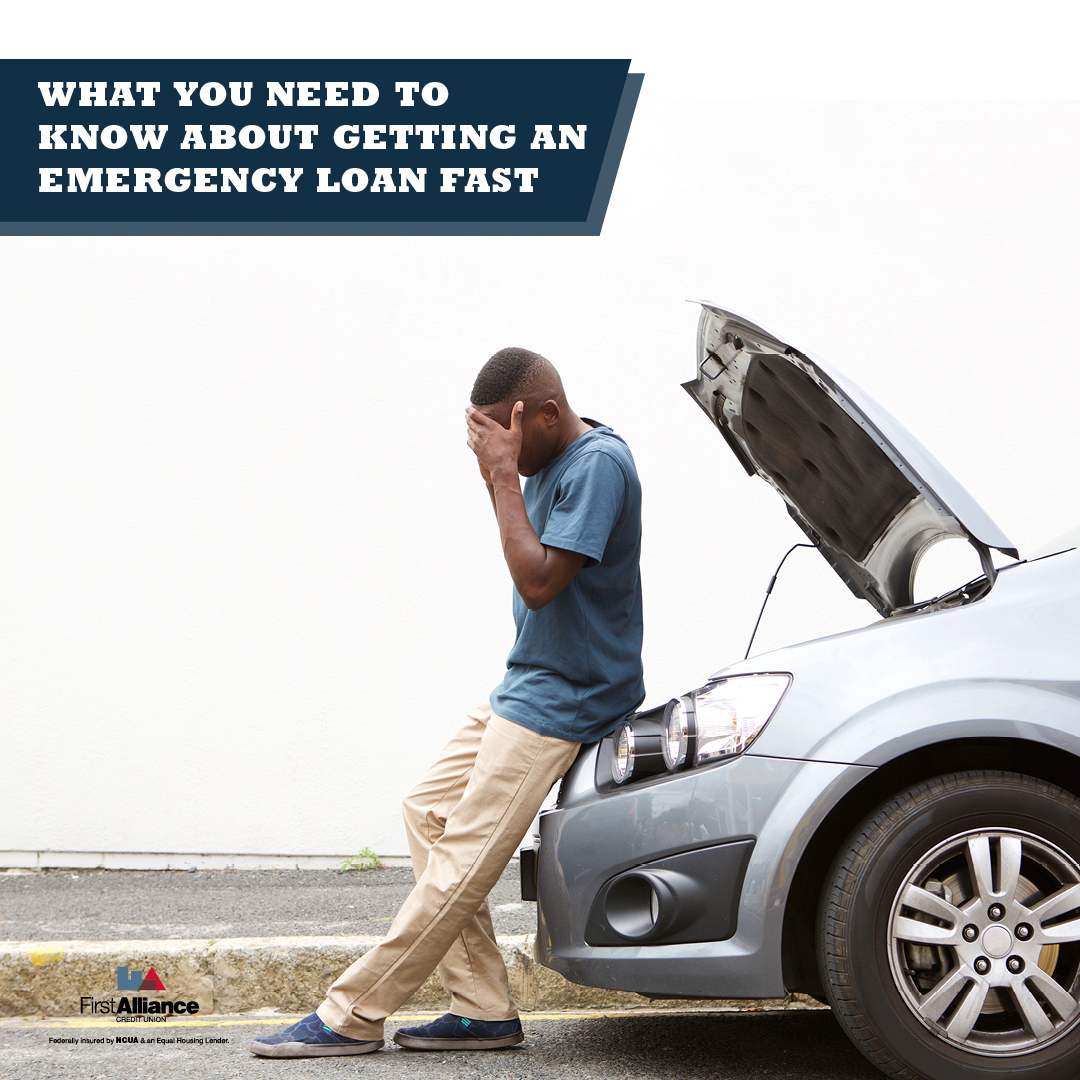How to Get a Personal Loan with Bad Credit
In a perfect world, you wouldn’t have to worry about your credit score when applying for a personal loan. In reality, though, that’s not the case....
7 min read
 Chris Gottschalk
:
Dec 12, 2023 4:45:00 AM
Chris Gottschalk
:
Dec 12, 2023 4:45:00 AM

Many financial blogs, including ours, talk about the importance of maintaining an emergency fund if you get hit with an unexpected emergency. However, what if you have an emergency that costs more than you have in your savings account? What if you get hit with multiple emergencies at the same time?
This is where emergency loans can be a lifesaver. An emergency loan can quickly give you money you can use to solve your crisis at hand. Here’s what you need to know to make the process of applying for an emergency loan as smooth as possible.

When people talk about an emergency loan, they’re usually referring to an unsecured personal loan. More specifically, they’re talking about a loan that gives borrowers their money quickly after they’ve been approved for the loan. One example of an emergency loan is the No Hassle loan First Alliance offers.
Personal loans aren’t the only type of loan you can use for an emergency. Other good options for getting emergency funds include:
It’s worth pointing out that Payday loans are also an option, but the terms of these loans also come with outrageous interest rates and terms that almost guarantee you’ll be stuck paying them off for years to come.
Anyone who's had to cover an unexpected expense knows how useful credit cards can be. However, credit cards also have a higher interest rate than most loans. It's okay to use a credit card to pay for emergencies, but you need to have a plan in place to pay it off as soon as possible.
The best strategy is to use your emergency fund to pay off the amount you charged to your card to cover the emergency. If the amount you put on your card is greater than the amount you put on your emergency fund, you should consider taking out an emergency loan to pay off your credit card debt.
An emergency loan can be a good idea if you need fast funding to cover an unexpected expense. However, they do have some drawbacks. You’ll want to be aware of both the advantages and disadvantages of getting an emergency loan to make sure it’s a good choice for you.
Quick turnaround: When you’ve got an emergency on your hands, you don’t want to wait. Credit unions and banks that offer emergency loans usually also have a shortened approval process so you can get the funds quicker. It's not unusual to find a lender that offers emergency loans with same business day or next business day approval.
Flexible: Emergency loan funds don’t have many, if any, restrictions. That means you can use that money in any way you see fit, which can be a huge help in solving emergencies.
Accessible: Many personal loans don’t require a perfect credit score in order to get approved. However, the lower your credit score is, the higher the interest you pay on the loan will be. Also, if you don't have a good credit score of at least 700, you may have a harder time getting approved.
Fees: Some emergency loans also come with fees, such as origination fees and early repayment penalties. You’ll want to ask in advance what fees the credit union or bank will charge for the loan.
Set loan amounts: Many emergency loans only offer a set amount of money. Depending on the emergency, the amount you get from the loan might not be enough money to cover your expenses.
Interest rates: Emergency loans often come with high interest rates, even if you have excellent credit.
The speed with which you can get an emergency loan really depends on the lender. Some will give same day approval, while others might take a day or two to process the emergency loan application. You’ll want to ask your lender beforehand about their potential processing times.
Once you’ve decided you’re going to get an emergency loan, you’ll need to figure out which loan you’ll get. Here’s what to keep in mind as you’re deciding:
One of the most important factors to consider when selecting an emergency loan is the interest rate. You’re probably aware that the higher the interest rate, the more you’ll end up paying over the life of the loan. As with most loans, the lower the interest rate, the better.
Stay away from loans that charge fees if possible. These include:
You’ll also want to ask any potential lender if they charge late payment fees for their emergency loans. This is especially important if you’re tight on cash due to an emergency and might need some additional time to come up with the money you need for the loan payment each month.
You’ll have to decide whether you’d prefer to have repayment terms that are longer or shorter. If you opt for a longer term loan, your monthly payments will be lower, but you’ll also end up paying more in interest over the life of the loan. Obviously, a short term loan will have higher monthly payments, but a lower overall cost throughout the life of the loan.
There’s no one right answer to whether a short term loan or a long term loan is better. You’ll want to consider how much money you can afford to use for loan payments each month, as well as what other debts you have, like credit card debt. One strategy you might want to consider is to get a long term loan with no early repayment fee, and then use any extra money you have to pay off the loan faster.
Many people who need an emergency are desperate to get money fast, and a lot of less-than-honest people are happy to take advantage of this. Do some research beforehand and make sure the lender you select has a good reputation.

Once you’ve selected which emergency loan you’d like to get, it’s time to apply for it.
Before you apply for an emergency loan, or any loan, you need to review your finances. It will show the lending advisor that you’re taking the loan application process seriously, and you also won’t be blindsided by any surprises, like unpaid debts, when the lending advisor checks your credit.
Start reviewing your finances by knowing how much you want to borrow and what you’ll use it for. In the case of an emergency loan, you might use it to:
Most of the time, you’ll know exactly how you’ll want to use the emergency fund. If you’re dealing with several emergencies at the same time, though, you’ll want to know beforehand which emergency the emergency loan will help solve.
Next, check your credit score. This will give you an idea of what a lender will be seeing when they look over your loan application. More importantly, it will also give you and idea of the interest rate you can expect to get for an emergency loan.
The more prepared you are for your loan appointment meeting, the better chance you have of getting the loan you need.
Make sure you bring in documentation of the emergency. This might include photos of the emergency, copies of the bills you need to pay off or estimates of what someone will charge for repairs.
You’ll also want to bring in copies of your last two pay stubs. This will give the lender an idea of your financial situation, help them calculate your debt to income ratio and help them determine what payment amount and term will work the best for you.
Filling out the loan application form is pretty straightforward. You’ll be providing specific information about yourself. What that information is depends on whether you’re getting an unsecured loan or a secured loan.
If you’re getting an unsecured loan, you’ll need to provide several key pieces of information about yourself, including:
However, if you’re getting a secured loan (a loan that requires collateral, like a home equity loan), you’ll need to supply some additional details about the collateral you’re using to secure the loan. Every financial institution’s process will be a little bit different, so make sure to ask what information you’ll need to bring beforehand.
Finally, you get to the part that stresses people out—meeting with a lending advisor. Unfortunately, the urgency of most emergency loans only increases the stress.
The good news is that most of the time, the meeting won’t be as stressful as you thought. What will happen is that the lending advisor will look over your information, then ask you some questions about why you’re applying for an emergency loan and how you plan to use the money. If you prepared in advance, you’ll already know these answers.
Once the lending advisor has that information, they’ll let you know if they can approve you for the loan, and how much they’re willing to lend you. If you do get approved, make sure to review the actual loan terms like the repayment period, the total cost of the loan and what fees you'll pay, including late fees and early repayment fees.
Emergencies are stressful in the best of circumstances, and realizing you need more money to solve an emergency than you have in your bank account is even more stressful. Fortunately, many lenders offer emergency loans for people who need them, and a lot of these loans have a quick turnaround time. When you know how to get an emergency loan fast, you can make emergencies a bit less stressful.
If you need to cover an emergency expense fast, apply for a No Hassle loan at First Alliance Credit Union. If you qualify, you'll get $1,000 you can use to pay any unexpected expenses, and they offer same day approval and no credit checks. You can also prepare for emergencies by getting a First Alliance personal line of credit or home equity line of credit to take care of unexpected expenses.

In a perfect world, you wouldn’t have to worry about your credit score when applying for a personal loan. In reality, though, that’s not the case....

There’s always something a little intimidating about applying for a loan. Maybe it’s the thought of having a stranger look at your financial life....

Financial emergencies can happen unexpectedly, catching you off guard and leaving you in dire need of funds. During these challenging times, an...